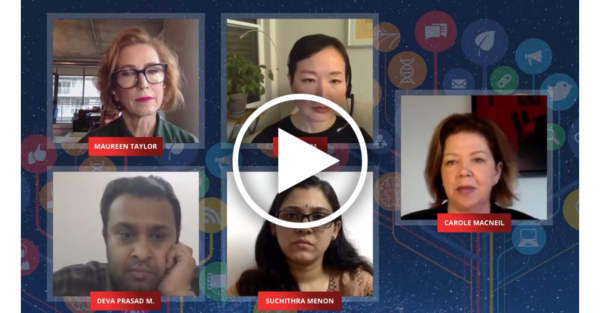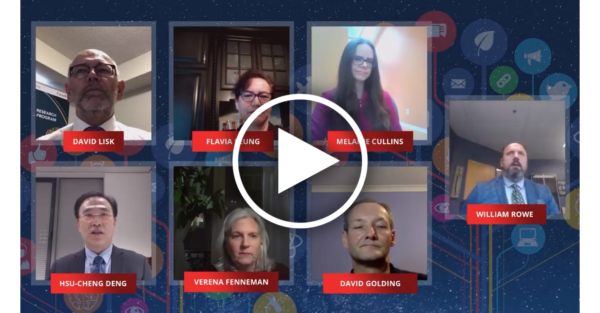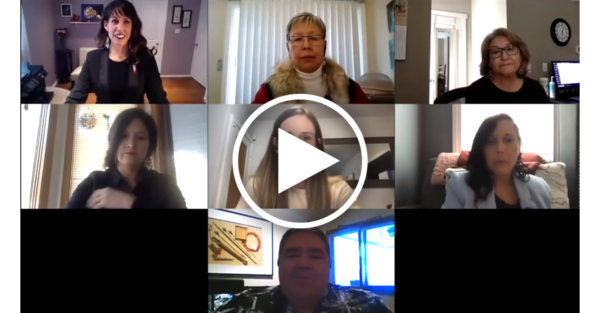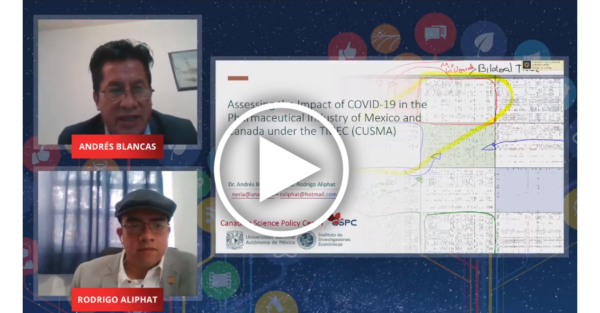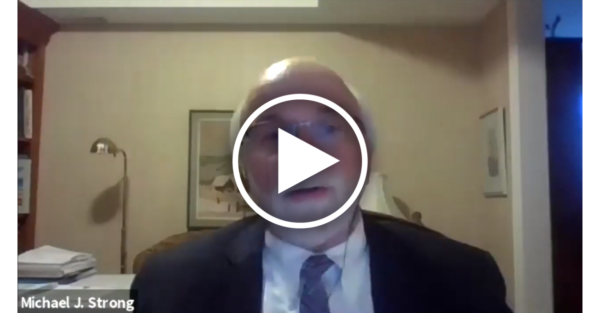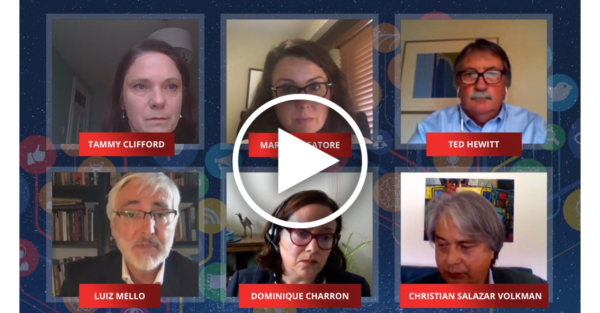The following are the CSPC 2020 panels that cover
COVID-19 – The Canadian and International Response
Conference Day 2 – November 18th 2020
Organized by: Hani Kim
Panelists:
Carole MacNeil – Journalist, Canadian Broadcasting Corporation
Maureen Taylor – Physician Assistant in Infectious Diseases, Michael Garron Hospital, Toronto
Hani Kim – Researcher and Program Officer, Bill & Melinda Gates Foundation
Deva Prasad M – Assistant Professor of Law, Indian Institute of Management, Kozhikode, India (IIMK)
Suchithra Menon – Assistant Professor of Law, Sai University, Chennai, India
Context: The U.S. response to COVID-19 is a sobering reminder that economic wealth and technological and scientific might are not sufficient to mount an effective public health response. Countries that have successfully controlled the epidemic underscore the critical importance of government’s investment in public health and public trust in the government’s leadership. This panel presented the lessons on COVID-19 control from three health care settings, Canada, Kerala State of India and South Korea, with emphasis on the sociopolitical context and health system.
Takeaways:
- Sustained government investments are key to strengthening public health systems, including trained public health personnel and labs.
- An effective public health response is one that includes consistent, timely and transparent communication of the risk to the public based on data.
- Public trust in the government can foster active civic participation in the epidemic response.
- Clear guidance and leadership from the national government and the national-level public health agency must be balanced with an appropriate level of decision-making power delegated to sub-national governments and public health authorities to reflect the specific needs of local populations.
Actions:
- Ensure that the messaging from national and state governments is fully transparent regarding the extent of uncertainty about the duration of the response in order to maintain public trust and support.
- Leverage the increasing surveillance data to learn about the evolving picture of transmission dynamics, which can guide governments towards a tailored control strategy.
- Direct greater efforts towards data-driven public education on the science behind the transmission of COVID-19, and the relative risk of developing severe disease to earn trust and active participation from the public.
- Be proactive in identifying and protecting social groups at an increased risk of severe disease and death and economic hardship (e.g., racialized communities, social groups showing greater degree of material deprivation).
Conference Day 2, November 17, 2020
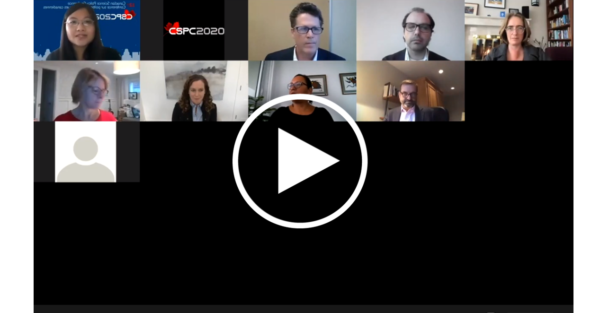
Organized by: George Poulakidas, Genome British Columbia
Panelists:
David Patrick – Director of Research, British Columbia Centres for Disease Control
Caroline Colijn – Canada Research Chair in Mathematics for Infection, Evolution and Public Health, Simon Fraser University
Nel Wieman – President, Indigenous Physicians Association of Canada
Cara Tannenbaum – Departmental Science Advisor, Health Canada
Pascal Spothelfer – President and CEO, Genome British Columbia
Context: In 2020, the latest findings surrounding SARS-CoV-2 and COVID-19 have been fed into policy and associated public communication with unprecedented speed. Evidence has been informing decision-making in real time across multiple policy domains. This crisis has required coordination and collaboration between different actors in the process: funders, researchers, healthcare agencies and policymakers. This session focused on these interfaces at a provincial and national level.
Takeaways:
- Pre-established connections between researchers, practitioners, and political decision makers were critical to the early response.
- Decentralized communication technologies enabled experts to coordinate their response to an urgent, complex crisis.
- A small but diverse, well-connected network initiated CanCOVID which acted as a nucleation site for a quickly expanded expert network that filled gaps in science advice and coordination across specialties and sectors.
- Informal systems were vital but gave way to formal committees as they stood up in different jurisdictions.
Actions:
- Establish and strengthen communication channels among researchers and between knowledge creators, analysts and decision makers.
- Greater integration between the academic, clinical, industrial and regulatory sectors is needed to build a full-spectrum biotechnology capability in Canada, including manufacturing and distribution capacity.
- Embedded academic positions within clinical and political organizations could streamline and accelerate needs-based research.
Conference Day 4 – November 20th 2020
Organized by: Universidad Autónoma del Estado de México
Panelists:
Marcela Virginia Santana Juárez – Professor, Faculty of Geography, Autonomous University of the State of Mexico
Samuel Do Carmo Lima – Professor, Federal University of Uberlândia
Eduarda Pires Valente da Silva Marques da Costa – Associate Professor, Institute of Geography and Spatial Planning, Universidade de Lisboa
Emmanuelle Quentin – Professor , Universidad UTE (Ecuador)
Giovanna Santana Castañeda – Professor, Faculty of Geography, Autonomous University of the State of Mexico
Context: The panel’s discussion focused on ways to strengthen the link between science and society, and generate knowledge so that society is more resilient, prepared, informed and proactive to events such as the COVID-19 pandemic, especially post-pandemic. Geography is an important factor in decision-making. It provides knowledge of the spatial and temporal behaviour of the COVID-19 pandemic, and its relationship with socio-spatial conditions, through the use of geotechnologies such as Geographic Information Systems (GIS), remote sensing and automated cartography, for spatial and geographical analysis.
Takeaways:
- Surveillance and safety measures worked at the beginning of the pandemic, but since then partial lockdowns are not enough. Cases of infections and deaths are increasing at a worrisome level.
- An in-depth analysis of the typologist, rate of infections, and the pandemic’s evolution in every territory has been collected. However, all these analyses need to be presented at national forums to be able to integrate knowledge and experiences that will contribute to and inform the decision of new policies. The big challenge is not only to produce the knowledge but to incorporate this knowledge into policy.
- Open access to data and the collaboration between government and scientists are crucial. In Ecuador, this has been impossible. The scientific community feels frustrated because the findings of their investigations are not considered during the decision-making process.
Actions:
- Collect complete and comprehensive data across territories (surveys) to identify the most vulnerable and affected populations.
- The general policies to contain the pandemic include quarantine as the main measure, and population mobility plays a major role in cutting the chains of contagion. However, most states register a decrease in mobility below 50%., so this measure should be strengthened.
- Governments should increase transparency and communication with their population and more importantly with the scientific community to obtain advice and information during the decision-making process.
- Populations have adapted well to the new normal and teleworking, but the government needs to start addressing solutions for the economic sector to alleviate the post-pandemic effect.
- Governments have to evaluate and understand the past, act rapidly in the present and anticipate the future to protect their population.
Conference Day 1 – November 16th 2020
Organized by: National Research Council Canada
Panelists:
David Lisk – Vice-President, Industrial Research Assistance Program (IRAP), National Research Council Canada (NRC)
Flavia Leung – Senior Policy Advisor, International Innovation Office
Melanie Cullins – Executive Director, International Innovation Office, National Research Council Canada
Hsu-Cheng Deng – Representative, Europe, Industrial Technology Research Institute (Taiwan)
Verena Fennemann – Head, European Research Area & Director, Fraunhofer EU Office Brussels
David Golding – Head of North America and Global Networks Innovate UK, Innovate UK
William Rowe – President and Chief Executive Officer, Nutrasource Pharmaceutical and Nutriceutical Services
Terrie Romano – Senior Policy Advisor, International Innovation Office
Context: The COVID-19 pandemic has resulted in government research and technology organizations (RTOs), innovation agencies and private sector companies stepping up to play critical roles in connecting universities, research and development funders, government laboratories and industrial capabilities with their national innovation systems and within their supply chains to address immediate needs resulting from the pandemic and prepare for the longer-term recovery to facilitate and agile and effective response, as well as helping to transition towards the post-COVID future.
Takeaways:
- In response to COVID-19, the NRC pivoted to support the government-wide response and to help protect the health and safety of Canadians. It was were not alone in changing directions as Canada is home to some of the most skilled and recognized researchers and companies in the world, who are also working hard to support Canada’s efforts to fight the COVID-19 pandemic.
- Innovation agencies across the globe have had to scale-up to deliver significant funding support to small- and medium-sized enterprises (SMEs) (e.g., grants and loans to help with cash flow, salaries to avoid layoffs). New innovation programs were launched or pivoted direction so that key federal actors, SMEs and researchers could collaborate on R&D projects that addressed short-term solutions, helped societies prepare for life after the pandemic, and prepared countries for a future pandemic.
- Existing platforms can help mobilize country responses. For example, the NRC worked with EUREKA, an international network for industrial R&D, to launch two calls for proposals to enable collaborative R&D and international co-innovation for short-and medium-term solutions to address COVID-19 challenges.
- Jurisdictions such as Taiwan used their experiences with SARS to establish and activate a Central Epidemic Command Center with early action on tightening border controls, practising social distancing, and mandatory wearing of face masks.
- COVID-19 brought together several key federal actors, SMEs and researchers in co-innovation programs around the globe to conduct R&D that addressed short-term solutions or a post-pandemic recovery, and to prepare for the next potentially high-impact one.
- Countries need to become resilient when it comes to the availability of essential goods, particularly during times of crisis. For example, European leaders have been calling for more “technological sovereignty” by reducing the region’s dependence on technologies developed in the US or China. Implementation of an open innovation platform for RTOs (Germany) helped enable exchange of information on COVID-19.
Actions:
- Be innovative and adaptable when it comes to transforming R&D strengths into solutions. For example, leverage strengths in areas like digital/information communication technology transformation (for company-level digitalization, security of supply, quantum commercialization), and green technologies to drive growth and a low-carbon agenda.
- Financial challenges are real. Find ways to bridge venture capital and research outcomes to promote technology commercialization.
- Expand domestic and international cooperation to mitigate operation risk.
- Orient research policy more strategically by placing greater importance on applied research and future technologies.
- Ensure that scientific data, not media sound bites or sensationalized headlines, drive public health policy and funding support for companies with real potential for commercialization and societal benefit. The UK has taken an evidence-based approach to education and awareness to combat the risk of public misinformation, and role of RTOs and government to combat misinformation by seeking scientific advice from respected scientists rather than any individual (e.g., UKRI has a public-facing website on science with easy to understand information).
Conference Day 4 – November 19, 2020
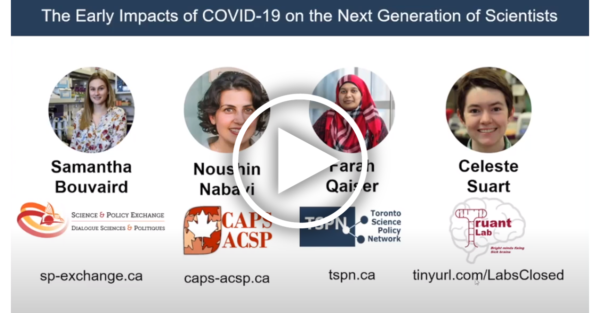
Organized by: Toronto Science Policy Network
Panelists:
Samantha Bovaird – Campaigns Coordinator, Science & Policy Exchange
Noushin Nabavi – Vice Chair, Surveys and Data, Canadian Association of Postdoctoral Scholars
Farah Qaiser – Co-Founder, Toronto Science Policy Network
Celeste Suart – PhD Student, McMaster University and Co-Founder of the SCAsource
Paul Dufour – Principal, PaulicyWorks
Context: The impact of COVID-19 on the Canadian research community will be felt long after the pandemic subsides, especially for members of the next generation. To respond to this imminent crisis, scientists tackled this issue in the only way they knew how: by collecting data. This panel brought together speakers from different organizations to share results from surveys that aimed to understand the specific challenges faced by trainees, post-doctoral fellows, and early-career researchers (ECRs) due to COVID-19, and to highlight opportunities for action to help support the future of science in Canada.
Takeaways:
- The issues facing graduate students and postdoctoral fellows during the pandemic are not new but have been exacerbated by COVID-19, exposing cracks in the foundations of Canada’s research ecosystem. Among the concerns identified: running out of money (personal and for research); disruption to research; work permit/immigration issues; delays in degree completion; fewer job opportunities; and increased mental health and wellness challenges.
- Institutions, provincial and federal funding agencies, individuals, and science policy organizations each have a responsibility to act on the survey data. (e.g., institutional changes in academia; more grant funding to support trainees and early career researchers; training in policy, business and management)
- It would be beneficial to have a unified Canadian science policy network to foster an interest in science policy at a grassroots level among the next generation of scientists.
Actions (including recommendations from surveys):
- Increase the number, value and eligibility period of federal scholarships and awards, with special attention paid to equity, diversity and inclusion. For example, at a post-doctoral level, this can include introducing a “stop-the-clock” policy when it comes to eligibility for post-doctoral fellowship applications, to provide extensions in fellowship durations for post-doctoral fellows whose research has been disrupted by COVID-19, and to create new funding opportunities for senior post-doctoral fellows to support those who are close to competing for faculty positions.
- Ensure external post-doctoral fellows are eligible for institutional benefits, and that professional development and training opportunities are available to post-doctoral fellows virtually.
- Mitigate the long-term impacts of COVID-19 on the ability of graduate students to conduct research. This could also include supporting work from home, aiding in the transition back to in-person laboratory work, and re-adapting the graduate learning experience as needed in these largely virtual and distant times.
- Invest in and improve mental health resources and support, such as by increasing the flexibility of long-term leaves-of-absence, and reducing wait times and institutions.
- Optimize future laboratory closures, with clearer communication and minimizing emotional fallout for trainees.
- Expand the career opportunities of early career researchers (ECRs) outside of academia, including new skills development such as science communication and science policy. This can be done by introducing additional funding opportunities (e.g., such as the NSERC Science Communication Skills Pilot grant), or by supporting existing initiatives or groups (e.g. student-run science policy groups) that can help ECRs transition into their desired career.
Resources : Rethinking Federal Research Funding by Science & Policy Exchange, Canadian Association of Postdoctoral Scholars Survey, The Early Impacts of COVID-19 on Graduate Students Across Canada by the Toronto Science Policy Network, When the Labs Closed: Graduate Students’ and Postdoctoral Fellows’ Experiences of Disrupted Research During the COVID-19 Pandemic by Suart et al.
To include if can be accommodated in proceedings book format:
Highlights from Surveys
- Science & Policy Exchange Survey
- 68% of respondents have applied for federal funding, of those only 52% were successful (1/3 of early career researchers (ECRs) are supported by federal awards)
- 91% of respondents value increasing the total number of awards
- 79% value increasing the value of awards
- 72% value increasing the duration of eligibility for all awards
- Canadian Association of Postdoctoral Scholars Survey
- About 1/4 of postdoctoral fellows indicated that the COVID-19 pandemic impacted their work permit/immigration
- 2% of respondent had to apply for EI, 14% of respondents noted that their fellowship/contract was negatively impacted
- 83% had to cancel work related travel, 38% experienced interruptions to their job application process, about 16% indicated that their work was not amenable to remote work
- Toronto Science Policy Network Survey
- 76% of graduate students reported a negative impact on their ability to conduct research as a result of COVID-19 related institutional closures
- 63% and 65% of research-stream graduate students anticipate at least some impact to their degree completion time, and future prospects respectively
- Graduate students are concerned about paying for tuition (67%), rent (66%), credit payments (54%)
- Graduate students are concerned about the stability and/or continuation of their income from teaching assistantships (66%), research assistantships (62%), stipends (69%)
- Mental Health and Wellness: Graduate students increasingly reported experiencing anxiety, depression, feelings of helplessness, loneliness, or being overwhelmed compared to before the pandemic. 26% of students were considering taking a leave of absence, compared to pre-COVID-19 (10%).
- Truant Labs and Research Square Survey
- Respondents were in what stage of grief during the shutdown?
- 36% bargaining, 18% depression
- Respondents were in what stage of grief with respect to Working from Home?
- 31% bargaining, 28% depression
- Respondents were in what stage of grief with respect to Future Outlook?
- 41% bargaining, 21% depression
- Respondents were most worried about
- Sickness of family or friends, the economy, delayed research, decrease competitiveness as a researcher, and lost research time
- Respondents were in what stage of grief during the shutdown?
Conference Day 2 – November 18th 2020
Organized by: Universidad Autónoma del Estado de México
Panelists:
Donovan Casas Patiño – Professor, Universidad Autonoma del Estado de México/RED Internacional en Salud Colectiva y Salud Intercultural
Luiz Eduardo Oliveira – Professor Health and Environment , Tiradentes University, Sergipe, Brazil
Mario Salazar Morales – Doctor in Public Health, USAC
Pedro Silberman – National Director of Human Capital, Ministry of Health, Argentina
Alejandra Rodríguez Torres – Physician in Family Medicine, Mexican Institute of Social Security
Georgina Contreras Landgrave – Researcher-Professor, Universidad Autónoma del Estado de México
Cristiane Costa da Cunha Oliveira – Professor, University of Tiradentes
Cristina Torres Andrade – Nurse and Midwife
Vicente Benites Zapata – Research Associate, Universidad San Ignacio de Loyola
Adan Flores Garnica – Universidad Autónoma del Estado de México
The following is a summary of the session:
Before the arrival of COVID-19 to Latin America, the Health System’s capacity was already overwhelmed, and the response capacity to this threat was considered limited. A great need for emergency policies to mitigate was required to alleviate the less privileged populations’ effect.
Not only the health systems were overwhelmed, but the limited access to Personal Protective Equipment and the low capacity of SARS-CoV-2 detection affected mitigation measures causing one of the worst crises in recent Latin American history. To flatten the infection curve, lockdown measures to reduce interpersonal contact caused economic contraction, paralyze production activity and destroy sectoral and aggregate demand.
Here some of the recommendations made by authorities in Latin America to contain the pandemic:
- Protect health professionals with personal protective equipment.
- Identify symptomatic people, perform tests, give results quickly and isolate them Identify communicators and quarantine them.
- The use of masks was recommended, with the instructions for the population to produce a fabric mask with materials available at home.
- Supporting and protecting people over 60 is everyone’s responsibility. Although all age groups are at risk for COVID-19, this group faces a significant risk of developing serious illnesses.
- measures of extended social distancing that should be maintained until the supply of equipment (beds, PPE, respirators and laboratory tests) can be controlled
Finally, it is necessary to obtain greater awareness in Latin America regarding the continuation of preventive measures for masks and washing hands, selective social distancing, and avoiding crowds at the current time of expanded social distancing flexibility. With the opening of schools and face-to-face practices, it is essential to respect schools and higher education institutions’ protocols and contingency plans.
Conference Day 2 – November 17th 2020
Organized by: AIM-HI Network
Panelists:
Shelley Wiart – Founder, Women Warriors
Hon Dr Lillian Dyck – Retired Senator, Senate of Canada
Michael Lickers – Indigenous Scholar in Residence, School of Leadership Royal Roads University
Jennifer Leason – Canada Research Chair, University of Calgary
Carrie Bourassa – Director, National Institute of Indigenous Peoples’ Health, Canadian Institutes of Health Research
Context: The panel explored the theme of global health in a pandemic by addressing the multifaceted health inequities experienced by Indigenous peoples. Each scholar addressed the health inequity experienced by Indigenous peoples in the spectrum of their life cycle from childhood to Elders. The goal was to amplify Indigenous academic voices at the conference to counter Western scientific and colonial deficit views of how to “help” Indigenous peoples cure their poor health with Western medicine.
Takeaways:
- Indigenous women are less likely to seek health care because of fear of racism, birth alerts and child apprehension, putting them at greater risk for poorer health outcomes.
- Though rediscovery camps have existed since 1978, they have not been well funded. Land-based education will help maintain sacred connection with land bases, knowledge of self and Indigenous traditional knowledge by teaching Indigenous language and leadership skills.
- Cultural safety is about power and equity relating to Indigenous peoples. It is defined by what is comfortable and safe for the Indigenous person in various settings, including healthcare. Desired outcomes include: acknowledging the value of knowledge, expertise and skills of Elders and Knowledge Keepers; and a strength-based approach that is solution oriented.
- Aboriginal science includes the idea of interconnectedness, and with that stems a respect for all. The mind includes the spirit and is part of pedagogy for Indigenous peoples whereby spiritual insights and creativity are passed on from previous generations.
- Feminist science is very important as women ask different questions (e.g., heart disease).
Actions:
- Create culturally safe spaces for Indigenous women seeking maternal health services by pushing for policy changes. Organizations doing this include the National Aboriginal Council of Midwives and Pauktuutit Inuit Women of Canada.
- Support and fund organizations such Ghost River Rediscovery Program that connect young with the land, engage in Indigenous leadership training, and connect back with their roots. (Recommended reading: Last Child From the Woods by Richard Louv.)
- Ethical engagement of communities in health research must be long-term, thoughtful, reciprocal and trusting to create strong relationships. The research should be conducted with a community-based health research approach, with opportunities for communities to hold grants, build capacity, and implement and disseminate the research. (e.g., Morning Star Lodge in Regina is a good example of this approach.)
- Indigenous communities must be leading the Indigenous health priorities in Canada, which requires policy change.
- The Health Care Act must be amended to include anti-racism language.
Conference Day 2 – November 18th 2020
Organized by: Institute of Economic Research
Panelists:
Andrés Blancas – Senior Professor, Institute of Economic Research, Universidad Nacional Autónoma de México
Rodrigo Aliphat – Ph.D. Student, Institute of Economic Research, Universidad Nacional Autónoma de México
Conference Day 1 – November 16th 2020
Organized by: Canada Research Coordinating Committee
Panelists:
Mona Nemer – Chief Science Advisor to Canada’s Prime Minister, Government of Canada
Michael J Strong – President, Canadian Institutes of Health Research (CIHR)
Roseann O’Reilly Runte – President and CEO, Canada Foundation for Innovation (CFI)
Ted Hewitt – President, Social Sciences and Humanities Research Council (SSHRC)
Alejandro Adem – President, Natural Sciences and Engineering Research Council of Canada (NSERC)
Roger Scott-Douglas – Acting President, National Research Council (NRC)
Context: The COVID-19 global pandemic brought to the fore an urgent need for researchers, post-secondary institutions and government agencies across Canada’s science, technology and innovation (STI) sector to collaborate effectively, develop joint research strategies and share research knowledge as quickly as possible. In this session, CRCC members discussed their efforts to mobilize the Canadian STI sector with national and international collaborators and policymakers, to engage the research strengths and capabilities of academia, government and other sectors, and to collaborate with global platforms while sharing lessons learned for addressing future global challenges.
Takeaways:
To support the government’s early response to the global COVID-19 pandemic, research funding agencies in Canada moved quickly to coordinate their efforts through the CRCC. Their efforts highlighted the importance of research coordination to rapidly address grand challenges like the pandemic.
- Canada’s response to the pandemic has been based on sound public policy, driven by evidence, and supported by the collaborative efforts of federal, provincial, and territorial governments under challenging circumstances. The pre-existing relationships and processes developed over time among government partners were a critical factor in the CRCC’s ability to respond effectively to the pandemic.
- Rapid-response funding, supported jointly and by individual agencies, permitted researchers in health and medical sciences, social sciences, the humanities, natural sciences, and engineering to pivot quickly and respond to the COVID-19 challenge. Additionally, the government mobilized private sector R&D, through existing programs and new challenge initiatives, to meet COVID-19 related needs.
- Research funding agencies continued to support the research community during the pandemic—not just those working on COVID-19—by moving quickly to a virtual environment and continuing to deliver regular funding competitions, and by taking a number of steps to help mitigate the impacts of the pandemic on their research communities.
- Interdisciplinary, cross-sectoral, national, and international collaborations continue to amplify the impacts of research on pandemic recovery and future resilience. To this end, Canada is working closely with international platforms to facilitate global efforts in information sharing, research collaborations, and knowledge mobilization (e.g., the United Nations Research Roadmap for the COVID-19 Recovery, the World Health Organization, and the Global Research Collaboration for Infectious Disease Preparedness).
- The pandemic has exacerbated inequities for many underrepresented groups—among the research community and Canadian society in general—who face greater risks of being directly and indirectly negatively impacted. The CRCC will continue to monitor the evolving impacts of the pandemic and listen and respond to the research community. The CRCC encourages collaboration between researchers across disciplines, and with a wide range of partners, to help get new knowledge into the community and ensure that recovery strategies reflect principles of equity, diversity, and inclusion.
- Open science and science literacy go hand in hand. The Chief Science Advisor – along with an international group of Chief Science Advisors – called on the scholarly publishing community to support immediate open access for all published articles on coronaviruses, SARS-CoV-2 and COVID-19.
- Early results from funded COVID-19 projects are already informing critical issues related to the pandemic in Canada and around the world, and will continue to do so for years to come.
- One of the important lessons learned from the pandemic is the critical role research data management plays in building a research system that reflects the FAIR principles—findable, accessible, inter-operable and reusable. Many researchers, institutions and other stakeholders have worked diligently during the pandemic to support FAIR research data management.
- The panel acknowledged the increased level of public attention to research and the accompanying opportunity to improve public understanding of science and counter misinformation. COVID-19 brought science to the forefront of the public consciousness and Canada should build on this momentum.
- The CRCC panelists agreed that it takes all of us contributing our skills, knowledge, and expertise to maximize the potential of research to address society’s greatest challenges. COVID-19 has provided a poignant reminder that collaboration really matters.
Conference Day 1– November 16th 2020
Organized by: the Office of the Chief Science Advisor of Canada and the Office of the Chief Scientist of Québec
Panelists:
Mona Nemer – Chief Science Advisor to Canada’s Prime Minister, Government of Canada
Rémi Quirion – Chief Scientist of Quebec, Government of Quebec
Juliet Gerrard – Prime Minister’s Chief Science Advisor, New Zealand, Kaitohutohu Mātanga Pūtaiao Matua ki te Pirimia
Jean-François Delfraissy – Chairman, France, National Consultative Ethics Committee (CCNE)
Patrick Vallance – Government Chief Scientific Adviser, United Kingdom
Krishnaswamy VijayRaghavan –Principal Scientific Advisor, Government of India
Context: Science advisors from around the world shared their insights into what the pandemic has taught them about how to approach other global challenges, be it full-blown fires such as COVID-19 or slow burns such as climate change. Panelists discussed the role of non-government experts in providing science advice, open science and access to real-time data, and public trust in science while conspiracy theories and misinformation are growing.
Takeaways:
- The COVID-19 response has presented many common challenges to science advisors around the world.
- Pressure to deliver information quickly on a high-profile issue. But uncertainty is a part of science – it takes time to discuss results before conclusions can be drawn and conclusions can change as new information becomes available.
- Coordinating responses requires multiple sub-teams looking at different aspects of the pandemic (i.e., modeling, therapeutics, vulnerable populations) – all in real-time as the pandemic is happening.
- Public communication needs to be clear but is often challenging, especially when it comes to non-pharmaceutical interventions (e.g., masking and social distancing) combined with testing, tracing, and isolation.
- With vaccines on the horizon, the challenge now is to build infrastructure and a plan for vaccine distribution and immunization. This includes record-keeping of who has received which vaccine and when a second immunization if needed.
- It is essential to have access to information and real-time data across jurisdictions, even municipalities. The presence of a Chief Science Advisor or equivalent facilitates the collaborations.
- The success of New Zealand’s pandemic response highlights the importance of acting early and aggressively, having strong leadership, and using time effectively as the country was hit a bit later and had international colleagues to turn to for available information about the initial response.
- Engaging early-career scientists offers perspectives on how young people are handling the pandemic and their concerns. It also provides advice on research funding opportunities, such as fellowships and scholarships, that can improve scientific activity in the future.
Actions:
- The pandemic has exposed weaknesses in data flow in many jurisdictions. We need better data access and integration to prepare for future emergencies.
- Build scientific capabilities in different departments so that science advice feeds internally rather than from one central source in the government. Establish networks of science advisors for better evidence-based decision-making.
- Since the Office of the Chief Science Advisor was only recently established in Canada, we were unequipped with lists of experts who can deal with various risks. This needs to be established ahead of time to avoid delays in receiving advice.
- To better prepare for a future pandemic, focus on interdisciplinary science. Zoonotic diseases, for example, involve fields like health and medicine, ecology, environmental sciences (i.e., identifying animal reservoirs), and climate change (i.e., a warming Arctic’s effect on bacterial exposure).
- Enhance science literacy, especially in an age when information travels so quickly. It is also important to enhance the public’s understanding of the scientific method.
- With vaccines on the horizon, the goal should be to vaccinate the entire world and not just individual, wealthy nations. Counter “vaccine nationalism” by partnering with countries with strong manufacturing capabilities to distribute the vaccine worldwide.
- A system of science advice needs to be well connected nationally and internationally, but it cannot be too bureaucratic. It needs to remain nimble and agile to ensure the flexibility to act quickly during times of emergencies.
Pre-Conference Day 1 – November 3rd 2020
Panelists:
Tammy Clifford – Vice-President, Research Programs, Canadian Institutes of Health Research
Christian Salazar Volkmann – Regional Director for Latin America and the Caribbean, UN Development Coordination Office (DCO)
Dominique Charron – Vice President, Programs and Partnerships, IDRC
Luiz Mello – Scientific Director, The São Paulo Research Foundation
Marisa Creatore – Assistant Scientific Director, Canadian Institutes of Health Research (CIHR-IPPH)
Ted Hewitt – President, Social Sciences and Humanities Research Council (SSHRC)
Context: The COVID-19 crisis has exposed stark global inequities, fragilities and unsustainable practices that pre-date this pandemic and have intensified its impact. Invited by the UN Deputy Secretary-General, Canada led a participatory process to create a UN Research Roadmap that will support an equitable global socio-economic recovery, as well as progress towards the Sustainable Development Goals. This session discussed the roadmap with collaborators from around the world and the role science must play in a strong and equitable recovery that protects the needs and rights of people who risk being left behind.
Takeaways
- The Canada-led work to develop a UN Research Roadmap identifies 25 key priority areas for research, which need to focus simultaneously on equity, resilience and sustainability, as well as issues like temporal urgency, cost and local context.
- Research funding needs to take a holistic and system-based approach that focuses on all aspects of the research ecosystem, including funding practices, methodological approaches, partnership structures, advisory systems and translational strategies.
- “Active science strategies” are needed that include: data infrastructure; implementation science; rapid learning systems; knowledge mobilization; and the science of how we do science.
- Research needs to be inclusive (e.g., gender, Indigenous, afro-descent populations, migrants, stateless individuals, refugees).
- Global, intersectoral, and interdisciplinary collaborations are incredibly important for recovery. Social sciences and humanities, in particular, need to be involved in any discussions concerning vaccines and treatments to ensure a focus on people and their behaviours, as well as economic and social policies.
- Knowledge translation experience and capacity is critical, especially at the local level (i.e., resource-poor communities) where frameworks developed by wealthier communities may not be effective. Funding agencies can play a role to ensure local resources are mobilized to address gaps that are regionally specific.
Actions
- Enacting this roadmap requires early collaboration and coordinated action from researchers (to tackle complex problems and find solutions), funding agencies (to ensure sufficient and coordinated investment to address these research priorities), and government and civil society organizations (to ask for and support research needed to inform recovery efforts, and institutionalize it in decision-making).
- Decision-makers need to act now with long-term goals in mind – use this as an opportunity to address goals of accessibility and equality.
- The roadmap needs to be operationalized, and disseminated widely among researchers, government officials and implementers.
- Create a platform around the roadmap that fosters collaborations across sectors and disciplines, globally and locally.

